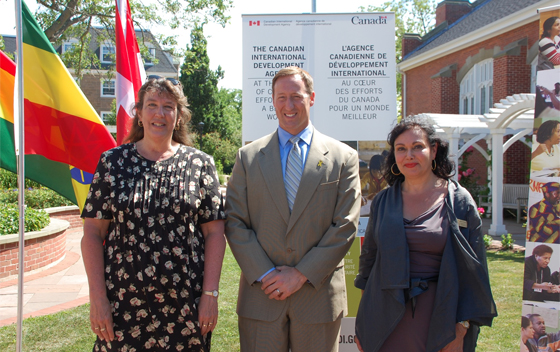Cuba is in the midst of some of its most significant economic change in decades: a series of ÔÇślineamientos,ÔÇÖ or directives, that call for the creation of a small, non-state private sector in several areas.
One of these areas is food production, where the status quo may surprise you: despite an ideal climate for many crops, Cuba presently imports 80 per cent of its food. Export products like tobacco and sugar dominate the countryÔÇÖs farms ÔÇö vestiges of a Cold War-era, Warsaw Pact production model that doesnÔÇÖt come close to meeting CubaÔÇÖs modern food needs.
So how do you revolutionize CubaÔÇÖs food production system, using economic models that are new to the country? You call on a trusted partner.
In this case, DalhousieÔÇÖs School of Public Administration, which has been working on projects with the Government of Cuba through the Canadian International Development Agency (CIDA) for almost 15 years.
ÔÇťWeÔÇÖve been involved in the kind of discussions over the years that youÔÇÖd only have with trusted partners,ÔÇŁ explains Martine Durier-Copp, director for the Centre for Advanced Management Education in the Faculty of Management. ÔÇťWe have the track record, the credibility, the longevity and the continuity that they like to see in a partner.ÔÇŁ
Integrated support for Cuban farmers
On Wednesday, the Honourable Peter MacKay announced close to $10 million in CIDA funding for two separate food security projects: one at the Coady International Institute at St.FX, and the other at Dalhousie. ╠ř
The Dal project will bring together the Faculty of ManagementÔÇÖs four schoolsÔÇöPublic Administration, Resource and Environmental Studies, Business Administration, and Information ManagementÔÇöto support the Cuban government in building capacity for local economic development and enhancing food security in four provinces: Las Tunas, Granma, Guantanamo and Santiago de Cuba.
ÔÇťThis project will help to contribute to food security and greater economic activity, which will result in people having greater access to food that they can buy locally,ÔÇŁ says Dr. Durier-Copp, who will be leading the project as its director. ÔÇťItÔÇÖs about moving Cuba to a more self-sustaining economy that can produce the food needed to feed its own people.ÔÇŁ
Each school in the Faculty of Management will be called upon to offer its specialized expertise. For example, the School of Public Administration will be working with government ministries to develop an enabling environment for small business: proper regulation, citizen involvement, consumer protection and so-forth. The Schools of Business Administration and Information Management will be supporting entrepreneurship among farmers and information/communications needs, respectively.
And one of the most exciting components will be the work of the School for Resource and Environmental Studies, helping build a sustainable food ecosystem in Cuba based on ÔÇťindustrial symbiosisÔÇŁ: using waste from one industry to fuel another.
Leveraging university expertise
Minister MacKay, at an event in Antigonish announcing the CIDA funding, explained how bringing university expertise to the front lines of CanadaÔÇÖs international assistance is a key strategy for helping those in need around the world.
ÔÇťOur Government will work with Canadian universities to deliver tangible results for people in developing countries,ÔÇŁ said Minister MacKay. ÔÇťBy tapping into their expertise, Canada will help provide support to people in need, giving them the economic tools they need to become self-sufficient over the long term.ÔÇŁ
For Dr. Durier-Copp, the strong relationship between ║┌┴¤│ď╣¤═°researchers and the Cuban government makes the project an ideal opportunity.
ÔÇťCuba is an extremely resourceful, talented and energetic partner,ÔÇŁ she says, ÔÇťThis is ideal development work, where you work from a confident relationship. I have to commend CIDA for allowing us to have this sort of longevity and continuity in our relationship with Cuba.ÔÇŁ
 Minister MacKay with Dr. Durier-Copp (right) and Pat Rodee, director of international research and development at Dalhousie, at the announcement event at St. FX. (provided photo)
Minister MacKay with Dr. Durier-Copp (right) and Pat Rodee, director of international research and development at Dalhousie, at the announcement event at St. FX. (provided photo)
╠ř

